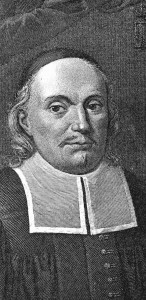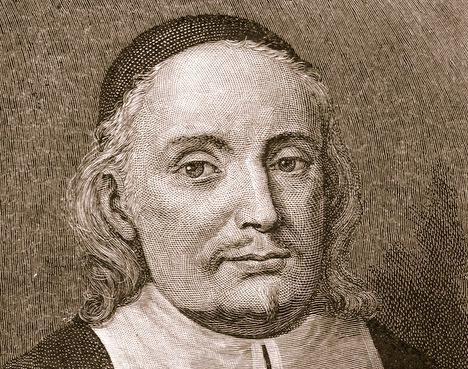 Paul Gerhardt (12 March 1607-1676) is widely considered the greatest German hymn-writer.
Paul Gerhardt (12 March 1607-1676) is widely considered the greatest German hymn-writer.
Some people reserve that title for Martin Luther, but Gerhardt is famous primarily for hymns, while Luther had some other accomplishments that boost his fame. As one scholar has argued, “Every Protestant hymn writer must undergo comparison with the great father of German hymnody and none can stand the test better than Gerhardt.”
In fact, so loyal a Lutheran was Gerhardt that the comparison is especially apt. Luther was the master of the bellicose Christian hymn on an Old Testament text: think of “A Mighty Fortress is Our God” with its Teutonic cadences taking up the boast of Psalm 46. Luther’s hymns are nearly all the confession of a church, not the testimony of an individual. It was the genius of Gerhardt to take that churchly faith as his basis, and then to sing his own personal experience on that foundation. The same scholar quoted above notes, “the hymns [of Gerhardt] no longer acknowledge the truths of the Gospel as in the days of the Reformation, but the poet lives them. Approximately one-eighth of Gerhardt’s hymns begin with “Ich,” while not one of Luther’s begins this way. Gerhardt’s hymns, then, proclaim his own personal experiences…”
If you’ve worshiped for a long time with songs and hymns that are filled with “I, I, I, I” and “my my my my,” Gerhardt’s turn to personal confession might not sound like such a blessing. But Gerhardt was just downstream from the Reformation with its grand churchly objectivity about salvation, and for an artist working in that time period, the decision to explore personal experience was electrifying. No art exists in a vacuum, and Gerhardt’s poetry had the luxury of being able to presuppose the robust doctrinal content of the then-recent Reformation. For ages like ours, which don’t have a living cultural memory of a period of intense biblical literacy and doctrinal insight, the “I, me, my, mine” songs seem vapid, even when they aren’t. Perhaps we are in a cultural moment opposite to Gerhardt’s, and resonate to the rare objective note.
Consider Gerhardt’s most famous hymn, “O Sacred Head Now Wounded,” which is so memorably used in Bach’s St. Matthew Passion. It is actually Gerhardt’s free translation of Bernard of Clairvaux’s 1153 hymn Salve caput cruentatum. Bernard of Clairvaux was a saint who knew how to speak of his relationship to God in terms of great intimacy and inwardness; one of his favorite themes was how impossible it was for anyone to understand the sweetness of the love of Jesus without having experienced it. Gerhard captures that perfectly in his German translation of Bernard’s passion hymn:
Nun, was du, Herr, erduldet, Ist alles meine Last;
Ich hab’ es selbst verschuldet, Was du getragen hast.
Schau her, hier steh’ ich Armer, Der Zorn verdienet hat;
Gib mir, o mein Erbarmer, Den Anblick deiner Gnad’!
Here, filtered through James Alexander’s 1830 englishing of it:
What Thou, my Lord, hast suffered, was all for sinners’ gain;
Mine, mine was the transgression, but Thine the deadly pain.
Lo, here I fall, my Savior! ‘Tis I deserve Thy place;
Look on me with Thy favor, vouchsafe to me Thy grace.
These are the words of a singer who knows himself to be personally involved in the passion of Christ. He has inserted himself, as it were, into the gospel narrative, as the choral responses in the St. Matthew Passion invite the listener to do.
Gerhardt is one of those foreign-language poets who English translators find irresistible: Nobody ever quite gets him right, but their loose translations and paraphrases are so good in their own right that they just keep trying.
